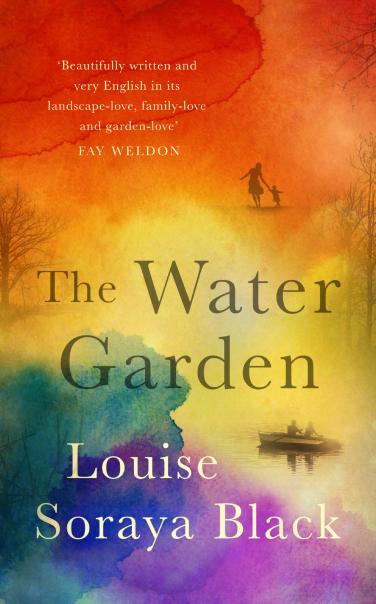 There was a fantastic response to my Summer Reads selection last week with every single title attracting lots of entries in a competition I ran on Twitter. It didn’t surprise me at all to see The Water Garden, the second novel by today’s guest Louise Soraya Black, in high demand. Look at that beautiful cover! At a time when many of us are frustrated that we can’t leave the UK even if there are good reasons, this book is a reminder to notice and appreciate the beauty closer to home. (It’s blazing summer today, which helps.) I’m delighted to welcome Louise to the Sofa to talk about capturing the simple pleasures of nature in words. My review follows:
There was a fantastic response to my Summer Reads selection last week with every single title attracting lots of entries in a competition I ran on Twitter. It didn’t surprise me at all to see The Water Garden, the second novel by today’s guest Louise Soraya Black, in high demand. Look at that beautiful cover! At a time when many of us are frustrated that we can’t leave the UK even if there are good reasons, this book is a reminder to notice and appreciate the beauty closer to home. (It’s blazing summer today, which helps.) I’m delighted to welcome Louise to the Sofa to talk about capturing the simple pleasures of nature in words. My review follows:
The English countryside has long been an inspiration for novelists and poets, from Thomas Hardy and William Wordsworth, to contemporary writers such as Melissa Harrison and Sarah Hall.
Having grown up mainly overseas and in cities, I too fell under the spell of the fields and woods of England when I arrived in Surrey. At first, it was idyllic: neat hedgerows, a patchwork of fields, grazing ponies, birdsong. As I roamed further, observing the countryside change through the seasons, I noticed other things: the screaming of creatures devoured as prey, dank mud that splattered everything, the unsettling feeling of being alone in the woods. Nature could be calm and peaceful, but it could also be wild, cruel, dangerously beautiful. I found this duality fascinating.
I’m also intrigued by gardens, this enterprise of taming nature, cultivating aesthetically pleasing flowers and shrubs, making order out of wilderness. Indeed, gardens are deeply ingrained in our collective culture and subconscious, from the Garden of Eden in the Bible to Paradise in the Quran. I’m not a gardener myself, however, I can see the pleasure it brings to those with green fingers; many believe that gardening is a form of therapy. In the short dark days of February this year, I listened to the audio book of The Secret Garden with my children, and its evocative descriptions of gardening made me long to plunge my fingers into the soil and smell green things growing; witness my children, pale from winter, grow hardy and strong. Giddy with excitement, I ordered spring bulbs for us to plant together, but had to abandon the plan when it snowed a few days later. Given my lack of gardening skills, it was no doubt for the best.
The Surrey countryside and gardens are the backdrop of my second novel, The Water Garden. In fact, the lake hidden away in the woods – the “water garden” from which the book takes its name, is almost a character in itself. Most of the drama takes place here; it’s a mysterious place, the scene of secret assignations, dark deeds, even death. Yet it is also a place of renewal and creativity, a place of healing and redemption. The idea of the title of my novel came to me after visiting the “Painting the Modern Garden; Monet to Matisse” exhibition at the Royal Academy in London. I was interested to discover that Monet was a keen horticulturalist; the gardens and lake depicted in his paintings were inspired by a water garden that he cultivated in Giverny. Here, in another art form, was this interplay between nature and creativity. During the war, Monet drew solace and comfort from his garden; it is the subject of many of his paintings, including the famous Water Lilies series. I bought a postcard of one of these paintings, which I kept beside me while finishing my novel.
Looking back at the novel now, with the distance that the journey to publication inevitably brings, I can see themes emerging. The duality of the countryside is reflected in my characters and the dilemmas they face: the tension between the wild and spontaneous, and society’s norms and expectations. It is a delicate balancing act. Unfettered freedom, and we risk chaos; impose too many rules, and our creativity is stifled.
The Water Garden was written in a pre-pandemic world, without any idea of what lay ahead in 2020. It’s clear that Covid has made our green spaces even more precious. During lockdown, when we were restricted to one outing a day for exercise, the woods and fields near us were almost overrun. The countryside became a place of escape, almost a refuge. My main character, Sarah, felt this way about the countryside before the pandemic; after a year of lockdowns and home schooling, I expect she would feel this even more acutely now. In Surrey we were fortunate to have the fields on our doorstep, but in cities too people flocked to parks, the riverside and green spaces.
During that first lockdown, the spring skies were empty and it was incredibly quiet; pollution cleared and there were reports of crystal-clear water in the canals of Venice and dolphins swimming near Southern Italy. Pelicans were wandering the streets of Central London and wild goats descended from the Welsh hills to roam the town of Llandudno. One silver lining of the past catastrophic year is perhaps our growing appreciation of the countryside and the urgent need to protect it.
Staycation reading
If travel overseas is difficult this summer, the following novels would make perfect staycation reads:
- Escape to Cornwall with Zennor in Darkness by Helen Dunmore
- Explore English rural villages in The River by Tricia Wastvedt and At Hawthorn Time by Melissa Harrison
- Immerse yourself in the Lake District in Haweswater and The Wolf Border by Sarah Hall
- Experience rural Wales in Eve Green by Susan Fletcher
- Discover the Yorkshire moors and a beautiful walled garden in The Secret Garden by Frances Hodgson Burnett
Thanks to Louise for this gorgeous piece and for the reading recommendations, which were a lovely surprise.

While my attention span has improved since its all-time low last year, I’m still finding it hard to fully lose myself in fiction, so any novel that pulls me in and holds my interest is an automatic standout. For anyone with similar issues The Water Garden may be what you’re looking for: it really took me to another place with its lyrical portrayal of the natural world and the complexity of human nature and relationships.
The writing is so vivid and visual that it’s almost like one of those virtual reality simulators, taking the reader with Sarah on her walks. Having shared some aspects of her experience of marriage and motherhood, I could empathise with her. The different strands leading to the present day drama are beautifully bound together; if anything, they are almost too interesting in that any one of them could have been a novel of its own. The dénouement ramps up both moral and narrative tension to unexpected levels. An enchanting novel which also explores some thorny questions about desire, loyalty and parenthood.
*POSTSCRIPT*
I am lucky to be heading to the Lake District soon with a plan to do little but walk, read and hopefully find some headspace to plan my next novel. The Summer Reads guest programme continues on 7 July with a post by Catherine McNamara on Older Love.

